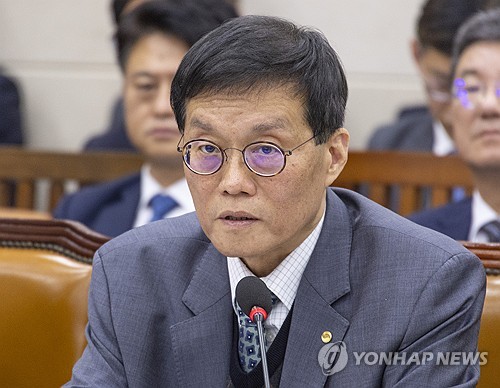
(Seoul=Yonhap Infomax) Seon Mi Jeong, Yoon Woo Shin – Participants in the Seoul foreign exchange market are widely expecting the Bank of Korea to hold its key interest rate steady at the upcoming Monetary Policy Board meeting on the 27th, and are not anticipating significant market impact from the decision.
According to a Yonhap Infomax survey of 17 domestic and international financial institutions on the 26th (screen number 8852), all experts polled forecast that the Bank of Korea will keep the base rate unchanged at this meeting.
With expectations for a rate hold at 2.50% already priced in—amid factors such as a strong dollar-won exchange rate and overheating in the real estate market—market participants expect only a limited reaction in the dollar-won rate and foreign currency funding markets.
“The market has already settled on a rate hold,” said a dealer at Bank A. “If, by any chance, the rate were cut, it would be a bullish factor for the dollar-won, but that scenario is highly unlikely.”
A dealer at Bank B added, “With the real estate market still not cooling, the Monetary Policy Board is widely expected to keep rates unchanged. It’s difficult to assign any special significance to the outcome.”
As a result, market attention is expected to shift to the press conference by Governor Rhee Chang-yong immediately following the meeting, though even this is seen as unlikely to have a major market impact.
“With a rate hold all but certain, Governor Rhee’s comments at the press conference will draw more attention,” said a dealer at Bank C. “Forward guidance will be the main focus.”
However, the dealer added, “Even if Governor Rhee adopts a hawkish tone, recent market moves have been driven by supply-demand dynamics, so it’s difficult to expect a stronger won.”
The dealer at Bank A also noted, “The likelihood of a hawkish stance from the Bank of Korea is low, and even if it does materialize, the won is unlikely to react positively. Even a non-hold decision would have only a limited impact.”
FX swap dealers similarly expect the Monetary Policy Board’s impact to be limited, with greater attention on whether the US Federal Open Market Committee (FOMC) will cut rates at its December meeting, which could have a larger effect on swap points.
Although recent comments from senior Federal Reserve officials have increased expectations for a rate cut next month, swap points—especially for short-term instruments—have not fully priced in this possibility.
“A rate hold at the November meeting is expected, and if the US cuts in December, there’s considerable room for short-term swap points to rise,” said a swap dealer at Bank D. “Longer-dated instruments are trading well below theoretical values, and assuming the expected rate path, swap points remain low. If supply-demand imbalances ease, there’s potential for an upward move.”
While the Korea-US interest rate differential is expected to narrow further, some note that swap points have not risen significantly despite the recent narrowing. “Given the extent of the narrowing so far, swap points should have risen much more, but the fundamental reason they haven’t is that South Korea’s dollar liquidity remains tight,” said a swap dealer at Bank E.
He added, “With quantitative tightening (QT) ending and the US government shutdown over from December, the release of dollars from the Treasury General Account (TGA) could have a greater impact, while the Monetary Policy Board’s influence will likely remain limited.”
The dealer also pointed to the potential impact of the National Pension Service’s FX hedging activities and the extension of the Bank of Korea’s currency swap lines. Should the National Pension Service intervene, it could push the exchange rate lower, but may have a negative effect on the foreign currency funding market.
smjeong@yna.co.kr
ywshin@yna.co.kr
(End)
Copyright © Yonhap Infomax Unauthorized reproduction and redistribution prohibited.

